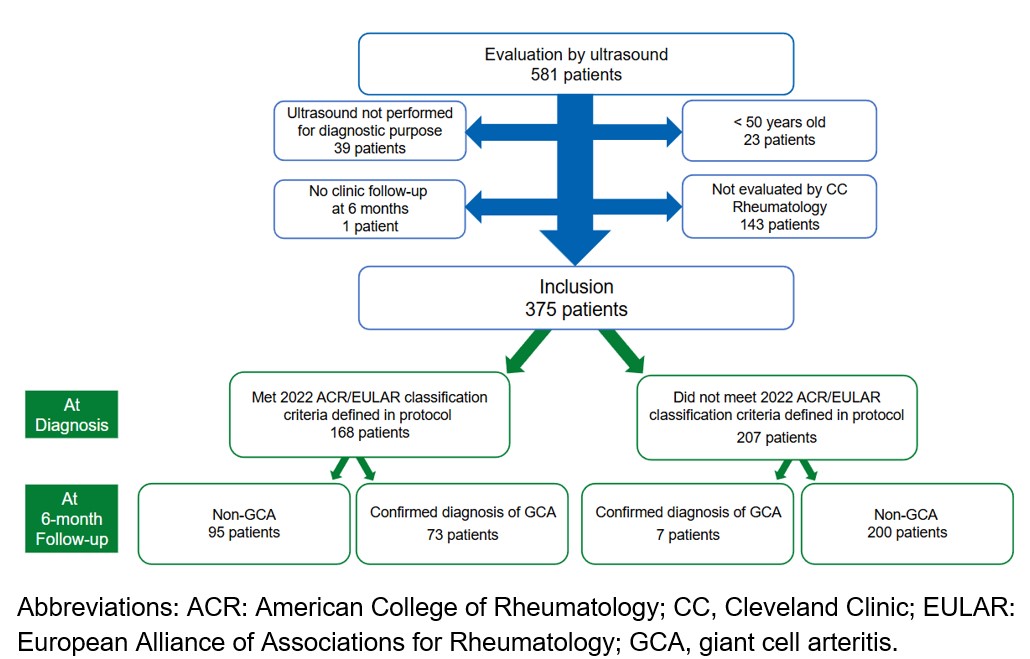Session Information
Date: Wednesday, October 29, 2025
Title: Abstracts: Vasculitis – Non-ANCA-Associated & Related Disorders II (2699–2704)
Session Type: Abstract Session
Session Time: 12:15PM-12:30PM
Background/Purpose: Diagnostic approaches to giant cell arteritis (GCA) differ between the United States (U.S.) and Europe, with Europe favoring rheumatologist-performed ultrasound and the U.S. relying on temporal artery biopsy (TAB). Limited U.S. data on ultrasound use in GCA and lack of vascular ultrasound (VUS) training among U.S. rheumatologists constrains clinical decision-making. We aim to evaluate the diagnostic performance of VUS, including temporal, axillary and vertebral artery ultrasound at Cleveland Clinic (CC) for the diagnosis of GCA.
Methods: Patients aged ≥ 50 years old with suspected GCA who underwent radiology-performed VUS and were evaluated at the CC rheumatology clinic on at least two visits, with a 6-month interval between visits from 12/2020 to 12/2024, were included in this retrospective cohort analysis. Patient demographics, clinical manifestations, and final diagnosis were extracted. At the 6-month follow-up, a confirmed clinical diagnosis of GCA was established by the clinician based on a combination of clinical symptoms, laboratory markers, imaging and/or pathological findings, exclusion of other potential diagnoses, and treatment response. Operating characteristics of VUS, including sensitivity, specificity, positive predictive value (PPV) and negative predictive value (NPV) were calculated and compared to a diagnosis of GCA, using the 2022 ACR/EULAR classification criteria for GCA (as defined in this protocol) and with a confirmed clinical diagnosis of GCA at 6-month follow-up. The correlation coefficient of VUS and TAB was generated in patients with a confirmed diagnosis of GCA at 6-month follow-up.
Results: In total, 581 patients underwent VUS of whom 375 patients met the inclusion criteria. Of these, 168 (44.8%) met the 2022 ACR/EULAR classification criteria and 80 (21.3%) had a confirmed clinical diagnosis of GCA at 6-month follow-up (Table 1). Patients diagnosed with GCA more commonly presented with positive VUS, higher scores on 2022 ACR/EULAR classification criteria, compared to those without GCA, while the occurrence of abrupt headache did not differ between the two groups (Table 1). The sensitivity, specificity, PPV and NPV of VUS compared to the 2022 ACR/EULAR classification criteria were 9.5%, 99.5%, 94.1% and 57.5%, respectively. When compared to the confirmed diagnosis of GCA at 6-month follow-up, the sensitivity, specificity, PPV, and NPV of VUS were 21.3%, 100.0%, 100.0%, and 82.4% respectively. A total of 135 patients (36.0%) underwent TAB, of which 22 biopsies confirmed GCA. The Cohen’s Kappa coefficient between VUS and TAB results was 0.64, indicating fair agreement (Figure 2).
Conclusion: In this cohort, VUS demonstrated low sensitivity but high specificity in patients with a confirmed diagnosis of GCA at 6-month follow-up; there was a fair agreement between VUS and TAB. Compared to reported sensitivity rates in existing studies, our findings indicate a lower sensitivity, underscoring the variability of VUS performance across different settings. Future work should aim to refine VUS protocols and acquisition techniques to assess performance across varied settings to ensure more consistent diagnostic outcomes.
 Algorithm of patient population
Algorithm of patient population
.jpg) Heatmap for positive temporal, axillary or vertebral artery ultrasound and positive temporal artery biopsy, indicative of a statistically significant asymmetry in the discordant classifications between ultrasound and temporal artery biopsy.
Heatmap for positive temporal, axillary or vertebral artery ultrasound and positive temporal artery biopsy, indicative of a statistically significant asymmetry in the discordant classifications between ultrasound and temporal artery biopsy.
.jpg) Characteristics of patients with/without confirmed diagnosis of giant cell arteritis at 6-month follow up
Characteristics of patients with/without confirmed diagnosis of giant cell arteritis at 6-month follow up
To cite this abstract in AMA style:
Ni R, Langford C, Kohler M, Dargham a, Katzan I, Zhang C, Hajj-Ali R. Diagnostic Performance of Vascular Ultrasound in Giant Cell Arteritis – A Single Center Experience [abstract]. Arthritis Rheumatol. 2025; 77 (suppl 9). https://acrabstracts.org/abstract/diagnostic-performance-of-vascular-ultrasound-in-giant-cell-arteritis-a-single-center-experience/. Accessed .« Back to ACR Convergence 2025
ACR Meeting Abstracts - https://acrabstracts.org/abstract/diagnostic-performance-of-vascular-ultrasound-in-giant-cell-arteritis-a-single-center-experience/
